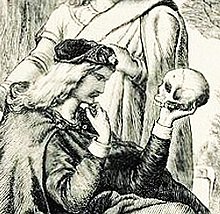William Shakespeare's Works/Tragedies

Shakespeare's Tragedies
[edit | edit source]Shakespeare's tragedies often hinge on a fatally flawed character or system, that is, a flaw ultimately results in death or destruction.
Scholars divide the plays into periods. A first-period tragedy (from 1590-1594) is Titus Andronicus. Shakespeare's greatest tragedies come from his second and third periods.
Romeo and Juliet is an example of a second-period tragedy, as is Julius Caesar.
In the third period, Shakespeare wrote Hamlet, Othello, King Lear, Macbeth, Antony and Cleopatra.
Titus Andronicus, about a Roman king whose daughter is raped, is full of violence and comedy.
Romeo and Juliet is about teenage romance and how it can be stopped by feuding families.
Julius Caesar is an historical tragedy concerning the ethics and consequences of political assassination.
Hamlet is about a tortured young prince who is obliged to kill his uncle to avenge his father's death.
Othello is about a Moor who is deceived by the machinations of his servant Iago, and his love for Desdemona.
King Lear is about a king who divides his kingdom between three daughters, two of whom turn on him and the third, who truly loves him, is unrecognized. This is considered to be Shakespeare's darkest tragedy and was not performed for many years.
Antony and Cleopatra is about two great lovers and nobility is an important theme in it. So are the relations between two very different cultures: Egypt and Rome.
Macbeth, set in Scotland, is about an ambitious Thane who murders the King in order to ascend to the throne.